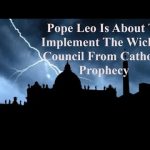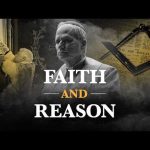Spanish protesters show their rosaries in Spain in protest against the action of the police on Nov. 28, 2023. / Credit: Nicolás de Cárdenas/ACI Prensa
ACI Prensa Staff, Dec 7, 2023 / 07:00 am (CNA).
On Dec. 8, the solemnity of the Immaculate Conception — the patroness of Spain — hundreds of Spaniards will gather to pray the rosary in public “for the unity of Spain” in more than 50 cities throughout the country.
Lay Catholics have been gathering in public recently to pray the rosary in response to the political, social, and moral situation in Spain and in resistance to pressure from the government, led by President Pedro Sánchez, to prevent these expressions of faith in the public square.
‘Immoral’ government deals
At the end of October and the beginning of November, the Spanish Socialist Workers Party (PSOE) announced the political deals necessary to remain in power after the general elections of July 23.
The parties that have come together to make these deals possible are broadly characterized as ideologically leftist for the most part, or as holding regional-nationalist or secessionist positions.
While Spain has a national government, the country is also governed by a decentralized system of regional governments known as “autonomous communities,” some of which have separatist tendencies to form their own nation such as Basque Country and Catalonia.
Among the parties in the political coalition government Sánchez has put together are EH Bildu — the political heirs of the terrorist Basque Marxist separatist group ETA, which claimed the lives of more than 800 people over 40 years — and Esquerra Republicana de Catalunya (Republican Left of Catalonia) and Junts per Catalunya (Together for Catalonia), which promoted the secessionist coup d’état in Catalonia carried out in 2017.
The deals reached include an amnesty law that would free from prison the Catalan secessionist leaders convicted of sedition and which would also leave unpunished the crimes related to that challenge to Spain’s constitutional order and territorial unity that have yet to be judged in court.
Some bishops, speaking as individual citizens — such as Jesús Sanz Montes of the Diocese of Oviedo — described these deals as “immoral” and charged that “those who committed serious and violent crimes against coexistence [the territorial unity of Spain], destroying the rule of law, are determining the future of a people with their bargaining chip.”
The Spanish Bishops’ Conference also recently expressed its concern about the social and political crisis that is being experienced in the country in a message titled “Encounter and Harmony Are Still Possible.”
Rosary for Spain joins citizen protests
On Nov. 3, when the agreement that included amnesty for the convicted secessionist leaders in Catalonia was already considered a done deal, protests began to take place near the national headquarters of the PSOE on Ferraz Street in Madrid, which were repressed by the National Police.
A little more than a week later, on Nov. 12, some laypeople began to pray the rosary outside the Shrine of the Immaculate Conception, a few meters from the site of the protests.
Thus, for two weeks, punctually at 7:30 p.m., the rosary was prayed without problems or incidents. When the rosary was over, some people on their own initiative joined the nearby citizen demonstrations against the government.
Rosary for Spain banned
The Organic Law that regulates the fundamental right of assembly provides that notice of public events must normally be given to the Government Delegation 10 days in advance. However, the law also provides for at least 24 hours notice to be given for urgent circumstances.
All events to pray the rosary in public during the two weeks prior to Monday, Nov. 27, had been communicated to the Government Delegation, which opted for administrative silence. This means that if there is no response from the administration, it is understood that nothing prevents holding the event.
But on Nov. 27, the Government Delegation gave the order to prevent the recitation of the rosary. At the usual time, numerous officers from the Police Intervention Units (UIP), or riot police, showed up in front of the church where the rosary was being prayed.
According to witnesses, the participants were told by the police that they could not proceed with the prayer, but the faithful continued praying the rosary anyway. The event organizer, José Andrés Calderón, was asked to show his ID and a woman was arrested.
That same night, Calderón announced another decision by the Government Delegation that banned the rosary rallies scheduled for Nov. 28, 29, and 30.
Rosaries in front of the police
The news about the ban announced Nov. 27 meant that at the event on Nov. 28 there was a somewhat more tense atmosphere than usual. Thus, hundreds of people gathered at the site in defiance of the government ban.
The prayer passed without incident until at its conclusion, when those in charge of the large contingent of police that was present went to speak with Calderón to inform him that they were going to fine him as the organizer of the event.
A rumor spread among the participants that Calderón was going to be arrested, so many people crowded around the young man and the National Police officers, defending the right to freely pray the rosary in public.
While the riot police put on their protective gear in preparation for the possible use of force, those who had come to pray held out their rosaries and formed a solid front facing off with the police, who retreated several meters along Marqués de Urquijo Street, perpendicular to Ferraz Street, where the PSOE headquarters is located.
After about 10 minutes of growing tension, with the participants shouting “Freedom!” and “Go away!” at the police, they decided on their own initiative to move over to adjacent Ferraz Street, where the anti-government protests first began, to continue showing their rejection of the deals made by President Sánchez after the July elections.
Rosary for the unity of Spain
In protest against the prohibitions imposed by the Government Delegation in Madrid, on Nov. 28 the call to hold a national rosary for the unity of Spain on Dec. 8 began to circulate among those present.
The initiative invited people, in a generic way, to gather to pray in front of the cathedral or main church of each town or city on the feast day of the patroness of Spain, the Immaculate Conception, “in communion with the rosary of Ferraz.”
On Nov. 29, despite the prohibition, the faithful gathered again for prayer. On that occasion, there were no moments of tension with law enforcement officers even though that morning, the Provincial Court of Madrid in response to an appeal filed by Calderón had upheld the decision of the Government Delegation.
Rosary for Spain in 50 cities
By Dec. 1, the nationwide call for a rosary on Dec. 8 had already been confirmed for 15 cities, and just five days later, 50 rallies spread throughout Spain were confirmed — and even one in Miami as well.
The promoters of the rosary rallies have also published a manifesto to be read on the feast day of the Immaculate Conception in all the places where this initiative is supported with the hashtag #RosarioPorEspaña on social media.
The manifesto
On Dec. 5, the “Manifesto of the Rosary for Spain” was released, which will be read at all prayer sites. It states that “the Spanish nation is at a crossroads” and that it is threatened by “its progressive balkanization, the takeover of Parliament by anti-Spanish forces, the destruction of the middle class, and the lack of a true national project.”
The manifesto stresses that Spain “suffers, above all, from a moral and spiritual bankruptcy” because “false secular religions” have corrupted “the deepest roots of the Spanish people.”
It furthermore notes that “the state has usurped the ‘auctoritas’ (authority) that the Church historically had” and that there is a twofold religious persecution: one “violent” and another “that is more invisible and dangerous” and that enters “into areas in which a ruler, unless he is a tyrant, could never meddle.”
The manifesto also underscores that “the line that separates the just form of government from the tyrannical has been crossed for a long time” in Spain and, understanding that “religion is the greatest enemy of every tyrant,” declares that “the Catholic has the duty to bear witness to their faith in all areas.”
The manifesto concludes by emphasizing that the national rosary for Spain is being held “with the purpose of worshipping God and venerating his immaculate mother. We pray for the intercession and help of the Virgin Mary to avoid the territorial and spiritual dismemberment of Spain. God is with us!”
This story was first published by ACI Prensa, CNA’s Spanish-language news partner. It has been translated and adapted by CNA.















